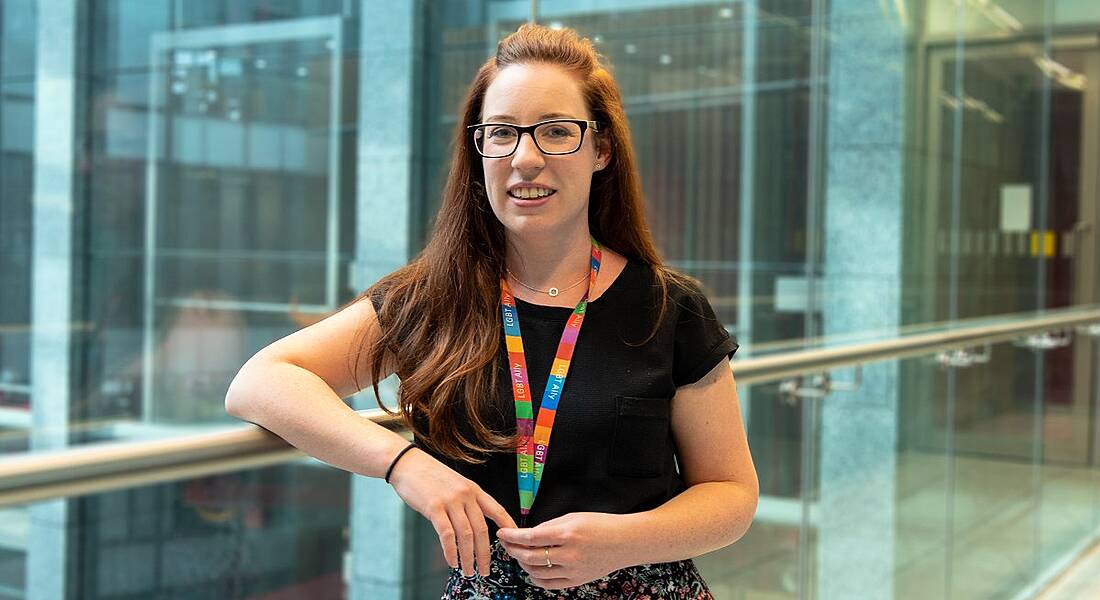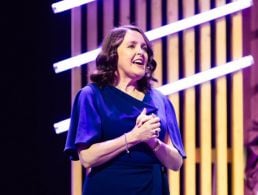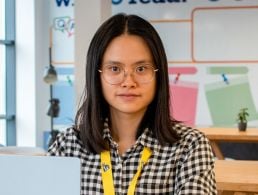New beginnings are inherently anxiety-inducing, but Ellen Brady’s start at Accenture was made easier by the simple yet effective systems the company has in place.
Envision the scene: you’ve been accepted to a graduate programme after a rigorous vetting progress. You wake the morning of, bleary-eyed, to the sound of your alarm clock and swat it into silence. Once you emerge from the fog of sleep, how are you feeling?
You’re probably nervous. Anyone would be nervous in that instance. New beginnings are daunting, especially when you’re a fresh-faced graduate about to step into your first post-college role.
For Ellen Brady, however, her start with Accenture was a calm one. All throughout the recruitment process, she found everyone to be friendly, supportive and helpful. She knew she would be given more support, training and even assigned a career counsellor.
We caught up with Brady to chat about her educational background and what it’s been like working with Accenture.
What did you study in college?
I studied psychology at University College Dublin (UCD), completing a BA in 2008 and an MLitt in 2010. Then, I went on to do a PhD in medicine at the University of Manchester.
With Accenture’s graduate programme, are you now working in your desired industry?
I have always been passionate about the delivery of healthcare and working with patients. Since I joined Accenture in 2015, I’ve had the opportunity to work predominately with healthcare clients and it has been extremely rewarding.
Accenture has also given me the opportunity to branch out into other areas of the business. Along with my client work, I’m very involved in the recruitment of graduates into Accenture as part of our university action team out on UCD campus, which I really enjoy.
It’s not an area that I would have anticipated working in before I joined. I’ve gained a huge amount of experience in areas such as the workforce of the future, employee experience and organisational development, which has aligned well with my background in psychology. It’s a fantastic way to stay connected to my alma mater.
Accenture has also supported me to complete a CIPD diploma in human resource management at National College of Ireland by covering fees and providing study leave. It complements on-the-job training well.
What drew you to Accenture when you were seeking work as a graduate?
The main thing that drew me to Accenture was its reputation of combining human ingenuity and technology to deliver innovative solutions.
My PhD research was focused on the use of digital health by patients with long-term conditions, so I was keen to apply the skills that I had developed during my PhD within a client setting.
I had also heard great things about the learning and development opportunities Accenture offers its graduates – from intensive classroom training to global webcasts and self-directed learning. Having no business background, it was important to me to work for a company that would give me opportunities to upskill and learn core consulting skills.
I found the interview process incredibly positive, and everyone I met – from the HR team that processed my application, to the managing director who interviewed me – was so supportive and encouraging. When I was offered the position with Accenture, I was happy to accept because of the company culture and calibre of people I had encountered.
What expectations did you have before you began the Accenture graduate programme?
I wasn’t sure what to expect, because I knew about the broad range of clients that Accenture works with and had heard that the role varied day to day.
I knew that I would be given training and support as part of the graduate programme and that I would be assigned a career counsellor when I joined, who would provide me with guidance and mentorship.
Knowing that those supports would be in place made the months leading up to my start date less daunting.
What duties and responsibilities were you given initially?
After completing several weeks of training in the Accenture offices, I was allocated a project and began work on client site.
Initially, I spent a lot of time supporting the Accenture team by providing project management input, reviewing documentation and other client deliverables, and carrying out research to underpin the recommendations the team was making to the client. As time went on, I began to take on more responsibilities but always had the people around me to rely on for advice, guidance and support.
Did the scope of your work change as the programme progressed?
I’ve been in Accenture for three years now and have experienced a huge amount of growth and development in my role in that short amount of time.
The level of responsibility grows along with your skillset and you’re encouraged to progress your career at quite a fast pace. I was promoted to consultant two years after I joined and that’s brought about an increased level of ownership within my project.
I’ve also developed specialised skills and grown my career in the direction that’s of interest to me. I’ve been able to shape my roles to build up experience in this area and been supported to do further study to add to the skills I’m learning on the job.
Can you describe a typical day in your role?
I spend most of my time based on client site, where we’re working with our client to deliver a large-scale transformation programme within the Irish healthcare system. Every day varies, but I might spend time delivering a presentation, facilitating workshops with my stakeholders, conducting some research into national and international best practice to make recommendations, or providing status updates to the client on our progress.
I occasionally have meetings in our offices at Grand Canal Square or The Dock, our global research and incubation hub on Hanover Quay.
How do your responsibilities compare to more experienced employees’?
It’s broadly similar in that, no matter what level you’re at, you’re encouraged to take on new responsibilities and grow your skills.
The support that you receive from more experienced employees is brilliant and people are very open to sharing their advice and experiences with you.
There are plenty of opportunities to work closely with those who are more senior than you and to learn from them.
Do you feel more prepared for working life after completing this programme?
Within Accenture’s graduate programme, once you pass your probationary period, you’re a permanent employee.
From day one, you’re immersed in working life and expected to take on responsibilities. Whether you stay in Accenture long-term or just begin your career there, it’s incredible training for whatever comes next.
Why should someone apply to the graduate programme at this company?
Accenture’s graduate programme has roles across analytics, consulting and technology, but what all those areas have in common is that you’ll be doing challenging and meaningful work within a client-facing role.
There’s also the added benefit of making some really great friendships through our many clubs and societies, including surfing, skiing, cookery, football, theatre, Toastmasters and rugby.




